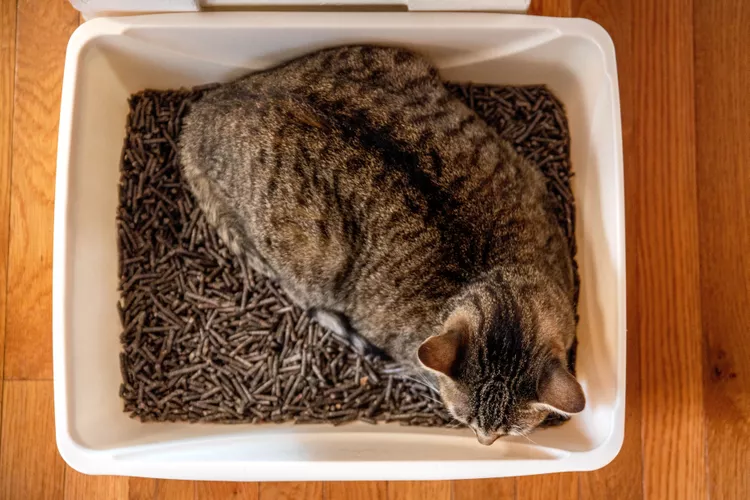Why Is My Cat Sleeping in Their Litter Box?

Cats can sometimes be found napping in some of the strangest locations. What if your cat has taken a sudden liking to napping in her litter box, though? There are medical reasons as well as behavioral reasons for a cat to suddenly start lounging where they go to the bathroom. Your vet can help you figure out the underlying reason for your cat's questionable choice in sleeping arrangements.
Medical Causes
In the world of pet care, a behavioral reason for anything is a diagnosis of exclusion. This means that all possible medical reasons must be ruled out first. Cats can get urinary tract infections, urinary crystal formation, and bladder stones frequently, so any urinary related symptoms you are seeing at home are medical in origin until proven otherwise. Urinary tract infections and urinary crystals or stones can make the lining of the bladder so inflamed that even the smallest amount of urine collecting in the bladder can make your cat feel like she has to urinate right then. A cat with a severe UTI or urinary crystals may lounge in her litter box simply because she feels like she has to use the box so frequently.
Sometimes a urinary crystal or stone can become lodged in your cat's urethra, causing an obstruction. These cats will go to the box frequently, trying to urinate but producing nothing and will cry or yowl with discomfort. This is life-threatening and a medical emergency. You should take your cat to your vet or a 24 hour emergency hospital immediately if you suspect your cat has a urethral blockage.
To rule out medical reasons for your cat sleeping in her litter box your vet will want to check her urine, an x-ray and/or ultrasound, and a blood panel. A urine test will show if there are any bacteria or crystals in your cat's urine causing a UTI. Imaging, such as an x-ray or ultrasound, will show bladder stones. Some stones can form without forming crystals in the urine and sometimes crystals in the urine won't aggregate into a stone, so it is important for your cat to have an x-ray or an ultrasound regardless of what the urine tests showed.
A blood panel will give insight into how your cat's kidneys are functioning. If your cat has early renal disease, an affliction common in senior kitties, she may start to urinary more frequently. There are also other disease processes unrelated to the urinary tract that can cause your cat to drink more and urinate more. Diabetes, for example, can be common in older cats and diabetic cats will have increased drinking and urination. A blood panel will check your cat's glucose levels and a urine test will check for the presence of glucose and ketones in the urine. An elevated blood glucose, especially in combination with glucose and ketones in your cat's urine are indicative of diabetes.
When it comes to house cats—that is, those cats that are actually living in a home and not an animal shelter, animal hospital, or boarding facility—a medical cause is going to be the most likely reason for litter box napping. If your vet has checked your cat's urine, blood, and images and everything comes back normal, though, then the reason for your cat's litter box naps truly is behavioral.
Behavioral Causes
A cat that finds herself under excess stress may hunker down in her litter box because it is a convenient place to hide, it makes them feel more secure, and because it smells like them and is, thus, familiar to them. Things like giving them a cozy box with blankets and pheromones to nap in instead of the litter box may be all these cats need.
Offer your cat a variety of beds and blankets to choose from. Some cats may like a bed that is a cubby-style versus your average, run-of-the-mill pet bed. Other, older cats may appreciate a more joint-friendly bed. One that utilized memory foam may be just what they are looking for. Just with dogs (and people) cats can get arthritis as they age. The most common locations for your senior or mature adult cat to have arthritis are her hips, back legs, and tail – all things she would use for jumping! So even if you have perfectly suitable beds, they may no be accessible to her anymore. If your cat has suddenly snubbed her longtime favorite bed on the back of the couch for her litter box, it may be simply because she can't get to her favorite bed anymore. Try moving her bed to a lower location and add some feliway, catnip, or silver vine to pique her interest.
Cats can curl up for a nap in seemingly bizarre locations and in impossibly uncomfortable looking positions. If your cat has taken a sudden liking to her litter box, though, there are things you can do to help coax her out of her smelly sleeping location. Your veterinarian can help you figure out the best way to help you cat out of the box and back into her bed.